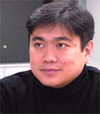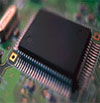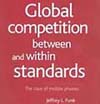|
|
|
|
| Special Interviews |
 |
|
|
|
Tsuruaki Yukawa (Senior staff writer, Jiji Press) |
 Tsuruaki Yukawa, senior staff writer at Jiji Press in Tokyo, isn't your typical Japanese tech journalist.
After graduating from California State University with a degree in economics, he elected to stay in Silicon Valley where he found work at a local newspaper before being hired by the US Jiji Press office. By then fluent in English, he started out translating news and research information - but he also tried his hand at writing copy and covering technology developments. It wasn't long before he found himself hired full-time as Jiji's Silicon Valley stringer, covering the US high-tech scene for consumption in Japan.
Yukawa was in Silicon Valley from 1987 until 2000, when he was asked to return to Japan as permanent staff writer. It's extremely rare for an overseas hire to be invited back to head office, and he has established himself as one of Japan's leading independent journalists covering the technology field.
In this wide-ranging interview, Yukawa comments on his experiences in California and offers an insider's view of the Japan high-tech scene. He also reveals which technology developments he's watching in 2003 ("there's a war going on between Microsoft and Sony") and what we can expect in consumer electronics, chip development, broadband, and wireless. (03/24/2003)
|
|
|
|
|
Joichi Ito (Founder and CEO of Neoteny) |
 Joichi Ito has been dabbling with computers since 1983, and later helped found one of Japan's first ISPs by lending out his spare bathroom as a server closet ("I was probably one of the first people in Japan to have a 128K-leased line in their toilet," he says).
He's since come a long way, and has established himself as one of Japan's leading entrepreneurs working in the Internet space. His first Web venture, Digital Garage, served as the springboard for Infoseek Japan (now the third-largest portal in the nation) and the Digital Advertising Consortium; Infoseek Japan was ultimately acquired by Rakuten, one of Japan's most popular online shopping malls. Digital Garage went public in 1999.
He is currently CEO of Neoteny, a company he founded in 1999. Neoteny initially received $20 million in venture funding from US VC firm Whitney and PSI Ventures, and has since raised some 4.7 billion yen in capital; the firm has served as an incubator and later as a VC itself.
Joichi Ito also devotes time to advising various government panels on Internet and IT policy, lecturing, writing, appearing on TV, serving as an "activist against government stupidity," and has attended the World Economic Forum in Davos, Switzerland, where he was selected as one of its "Global Leaders for Tomorrow" in 2002. He's also a leader and keen participant in Japan's nascent "Weblog" internetworking scene, thought by many to be a key element in the emergent democracy movement. (03/13/2003)
|
|
|
|
|
Eric Williams (Ph.D. United Nations University, Tokyo) |
 Do you own a PC? Perhaps two? What about a laptop? Or a PDA? Or even a cell phone? If you're reading this, chances are you own at least several of these digital devices - and likely use several more at your place of work. Did you ever stop to think what it costs to create these devices - not in dollar terms, but in environmental burden? How much fresh water does it take to create a shiny new PC - or how much air will be polluted to produce the electricity that runs it?
Dr. Eric Williams and his colleagues at Tokyo's United Nations University have produced a fascinating study examining the environmental impact of the information technology revolution, focusing on what it takes to create a single DRAM (dynamic random access memory) microchip - one of the most widely-used components in computers and other digital devices. While the amount, say, of fresh water that is required to produce a single 2-gram memory chip is arguably not that significant (about 32,000 grams), consider that Japan, Korea, the US and other countries are producing hundreds of millions of these chips annually. That's a lot of water, and in our video interview, Dr. Williams offers insights into how we should start thinking about this pervasive environmental challenge. (02/25/2003)
See also: The 1.7 Kilogram Microchip: Energy and Material Use
in the Production of Semiconductor Devices.
Eric Williams, Robert Ayres, and Miriam Heller.
Environmental Science & Technology 36 (24). 5504-5510. Dec. 15, 2002
http://www.it-environment.org/publications.html
|
|
|
|
|
Jeffrey Funk (Professor, Kobe University) |
 "There has to be some incentive for handset manufacturers to change the phone from a voice-based device to a text-based device - and that incentive only comes about when there are users. So, you've got the chicken and the egg problem: Do we have users first or do we have phones first?" In Japan, says professor Jeff Funk, we find the evolution in content - from simple ring tones and images to camera phones and sophisticated applications - required to solve this chicken-and-egg dilemma. The result? The world's most lively mobile Internet industry. Join GLOCOM Platform host Daniel Scuka in a wide-ranging interview with Kobe University's Dr. Jeffrey L. Funk, one of Japan's leading academic experts on the business models and success factors associated with the wireless Internet. (02/13/2003)
|
|
|
|
|
Gregory Clark (Honorary President of Tama University) |
 The Center for Global Communications presents Mr. Gregory Clark speaking on the need to unlock the trillions of yen frozen in Japanese consumers' bank accounts before any significant economic recovery can be expected. Based in Japan for over 30 years, Mr. Clark is president emeritus of Tama University, author, speaker, and a well known commentator on Japan's economics, culture, and politics. (02/03/2003)
|
|
|
|
 Top Top |
|
|





